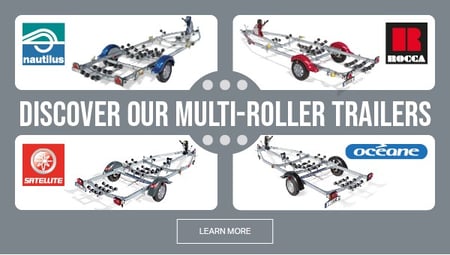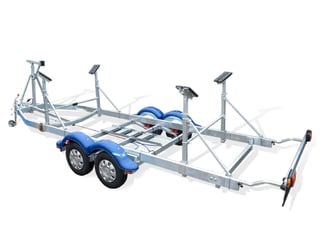WHAT ARE THE DIFFERENT TYPES OF BOAT TRAILERS ?
Each boaters has its own boat, and its own trailer!
You are lost between the different models of trailers? Don't worry, we'll help you see things clearly!
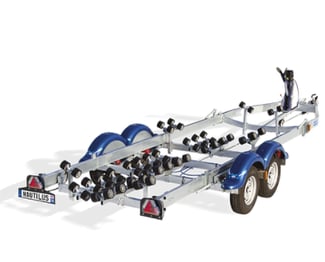
This is the most common boat trailer on the market, it is equipped with several rollers grouped in pairs and mounted on outriggers. The frame of these trailers can be either boom-shaped (with a triangle at the end of the hitch and side rails) or drawbar-shaped (with a single bar connecting the hitch to the load-bearing part of the frame). These trailers are made for boats with V-shaped hulls, which are most of the powerboats on the market. The multi-rollers system allows simplified launching and unloading. If the hull has special features such as steps or bow thrusters, it is possible to put inflatable rollers that can pass over the relief of the shell.
Boat: rigid V-hull, rib
Example: Cap Camarat, Merry Fisher, Antares, Barracuda, Pacific Craft, Zodiac, Lomac, Capelli Tempest, etc.
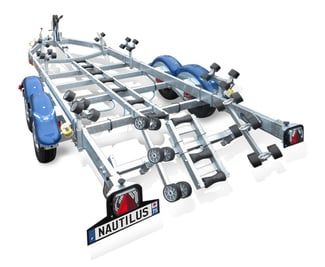
These trailers are made for boats with keels or Y-hulls, that is, they have an outboard edge running the entire length of the hull in the center. They are equipped with a keel roller track (diabolos) that runs the entire length of the trailer. Rollers are installed on the sides to maintain the hull walls, but the whole bottom rests on the diabolos.
Boat: rigid boat with low (maximum 50cm) Y-hull (with keel)
Example: Guy Marine Antioche
Sailboats with a fixed daggerboard can be tricky to transport because all their weight rests on the same keel, so you need a specific sailboat trailer. This trailer has a keel well in its center (usually lined with rubber to avoid contact with the metal) on which the keel rests. In addition, 4 reinforced stanchions equipped with skids are installed on the sides to hold the hull of the sailboat. It is very important to know the draft of the boat to determine the height of these stanchions.
Boat: Sailboat with dagger board or high fixed keel (minimum 50cm)
Example: Sun Odyssey, Oceanis
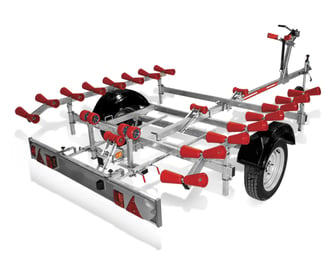
Some yacht tenders may have a suitable trailer, generally these boats are RIBs with soft or fragile bottoms, and therefore they must be placed on their flanges for transport. These trailers have two lateral rows of diabolos and some central rollers to support the bottom.
Boat: ribs with soft bottom, ribs with aluminium bottom, pneumatic tenders
Example: Mercury Quicksilver Inflatable, Zodiac Cadet annexe
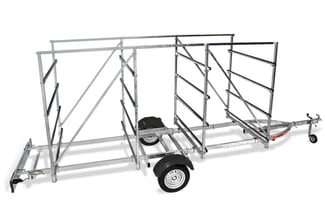
Light dinghies with lifting daggerboards or keels can be transported on specific trailers equipped with a V-shaped support for the front of the bow and a fiber strap for the rear. These hulls are generally fragile and do not withstand the pressure of the rollers. These trailers can also have a manual launching cart integrated into the rolling chassis. A mast support is also mounted on the tongue of the trailer.
Boat: light dinghy with removable keel or dagger board with removable rigging
Example: Laser, 420, Déclic
Rowboats :
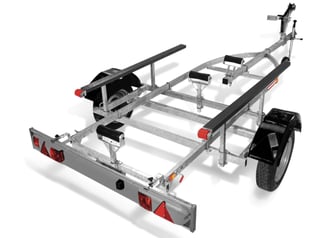
These trailers are equipped with two ramps, either carpeted or plastic. Carpeting is not recommended because it prevents the boat from sliding properly and salt (or limestone) can easily get stuck and damage the hull.
Boat: flat hull, rowing boat
Example: FunYak, Rigiflex
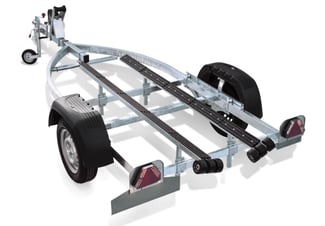
Trailer equipped with ramps (ideally Easygliss for easy launching) and waterproof LED lights. These trailers often go in the water for launches and require frequent maintenance.
Boat : Jet ski
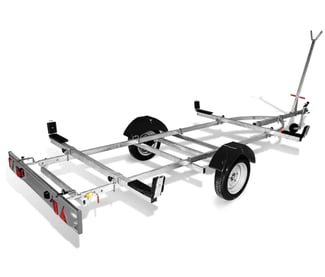
Trailer equipped with 4 flat rubber supports arranged in a rectangle to support the front and rear of the catamaran floats. It also has a support for the mast, positioned on the boom of the trailer.
Boat: lightweight catamaran
Example: Hobbie cat 16, Topper
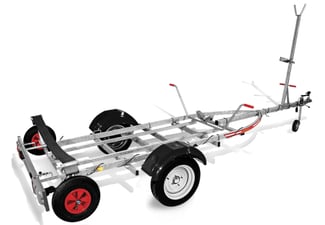
Tailer popular with sailing schools that carry several Optimists (or equivalent light dinghies). It is composed of a chassis and storage racks fixed on the top to stack the Optimists without them touching each other. You can put from 3 to 10 Optimists and store the rigs in a box underneath.
Canoe/Kayak/Sailboard trailer:
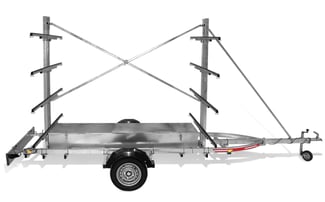
This trailer is equipped with a large storage box and two mounts with spreaders to accommodate long thin hulls or boards. This allows them to be stored and taken out on the sides. Up to 10 canoes or boards can usually be stored in this trailer.

